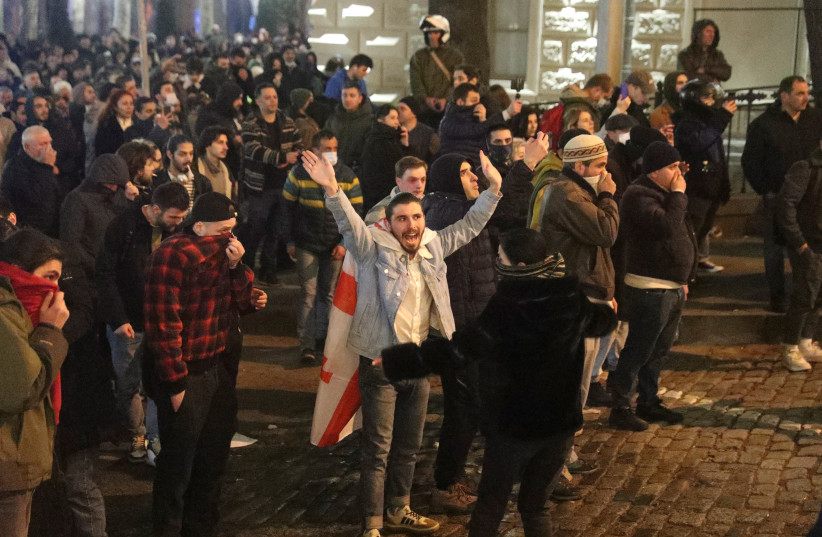Georgians protest approval of Russian-inspired 'foreign agents' bill

Critics have said it is reminiscent of a 2012 Russian law that has since been used to crack down on dissent.
Georgian police used tear gas to disperse protesters on Tuesday in central Tbilisi after parliament gave its initial backing to a draft law on "foreign agents" which critics say represents an authoritarian shift in the South Caucasus country.
The law, backed by the ruling Georgian Dream party, would require any organizations receiving more than 20% of their funding from overseas to register as "foreign agents" or face substantial fines.
Critics have said it is reminiscent of a 2012 Russian law that has since been used to crack down on dissent.
Georgian television showed protesters angrily remonstrating with police armed with riot shields who then used tear gas. Local television said police also used water cannons to disperse the protesters.
Earlier, the law had comfortably passed its first parliamentary reading, Georgian media outlets reported.
Some of the protesters gathered outside the parliament building carried European Union and US flags, and shouted: "No to the Russian law."
Speaking in Berlin earlier on Tuesday, Georgian Prime Minister Giorgi Garibashvili reaffirmed his support for the law, saying the proposed provisions on foreign agents met "European and global standards."
"The future of our country doesn't belong to, and will not belong to, foreign agents and servants of foreign countries," he said.
Ruling party accuses critics of opposing Georgian Orthodox Church
The ruling party, which says it wants Georgia to join the European Union, has accused critics of the bill of opposing the Georgian Orthodox Church, one of the country's most respected and influential institutions.
On Monday, a committee hearing on the law ended in a physical brawl in parliament, as the chairman of the legislature's legal affairs committee appeared to physically strike the leader of the opposition United National Movement, which opposes the bill.
President Salome Zourabichvili, who was elected as a Georgian Dream candidate, has said she will veto the bill, which she says endangers Georgia's hopes of joining the EU. Parliament can override her veto.
More than 60 civil society organizations and media outlets have said they will not comply with the bill if it is signed into law.
Georgia's government has in recent years faced criticism from observers, who say the country is drifting towards authoritarianism. In June, the EU declined to grant Georgia candidate status alongside Moldova and Ukraine, citing stalled political and judicial reforms.
Jerusalem Post Store
`; document.getElementById("linkPremium").innerHTML = cont; var divWithLink = document.getElementById("premium-link"); if (divWithLink !== null && divWithLink !== 'undefined') { divWithLink.style.border = "solid 1px #cb0f3e"; divWithLink.style.textAlign = "center"; divWithLink.style.marginBottom = "15px"; divWithLink.style.marginTop = "15px"; divWithLink.style.width = "100%"; divWithLink.style.backgroundColor = "#122952"; divWithLink.style.color = "#ffffff"; divWithLink.style.lineHeight = "1.5"; } } (function (v, i) { });

